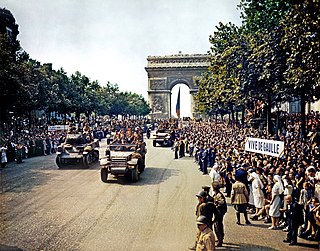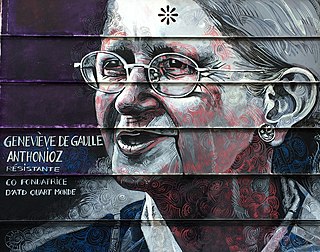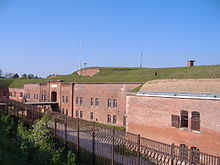
Jean Pierre Moulin was a French civil servant and resistant who served as the first President of the National Council of the Resistance during World War II from 27 May 1943 until his death less than two months later.

Free France was a political entity that claimed to be the legitimate government of France following the dissolution of the Third Republic. Led by French general Charles de Gaulle, Free France was established as a government-in-exile in London in June 1940 after the Fall of France during World War II and fought the Axis as an Allied nation with its Free French Forces. Free France also supported the resistance in Nazi-occupied France, known as the French Forces of the Interior, and gained strategic footholds in several French colonies in Africa.

Pierre Joseph Auguste Messmer was a French Gaullist politician. He served as Minister of Armies under Charles de Gaulle from 1960 to 1969 – the longest serving since Étienne François, duc de Choiseul under Louis XV – and then as Prime Minister under Georges Pompidou from 1972 to 1974. A member of the French Foreign Legion, he was considered one of the historical Gaullists, and died aged 91 in the military hospital of the Val-de-Grâce in August 2007. He was elected a member of the Académie française in 1999; his seat was taken over by Simone Veil.

Pierre Brossolette was a French journalist, left-wing politician and major hero of the French Resistance in World War II. He ran an intelligence hub of Parisian resistance at the Rue de la Pompe, before serving as a liaison officer in London, where he also was a radio anchor for the BBC. Arrested in Brittany as he was trying to reach the UK on a mission back from France alongside Émile Bollaert, Brossolette was taken into custody by the Sicherheitsdienst. He committed suicide by jumping out of a window at their headquarters on 84 Avenue Foch in Paris as he feared he would reveal the lengths of French Resistance networks under torture; he died of his wounds at Pitié-Salpêtrière Hospital later that day. In 2015, his ashes were transferred to the Panthéon with national honours at the request of President François Hollande, alongside politician Jean Zay and fellow Resistance members Germaine Tillion and Geneviève de Gaulle-Anthonioz.

Mikhail Nikolayevich Tukhachevsky, nicknamed the Red Napoleon, was a Soviet general who was prominent between 1918 and 1937 as a military officer and theoretician. He was later executed during the show trials of 1936-38.

The liberation of Paris was a military battle that took place during World War II from 19 August 1944 until the German garrison surrendered the French capital on 25 August 1944. Paris had been occupied by Nazi Germany since the signing of the Armistice of 22 June 1940, after which the Wehrmacht occupied northern and western France.

The National Front for an Independent France, better known simply as National Front was a World War II French Resistance movement created to unite all of the Resistance Organizations together to fight the Nazi occupation forces and Vichy France under Marshall Pétain.

Pierre-Henri Teitgen was a French lawyer, professor and politician. Teitgen was born in Rennes, Brittany. Taken POW in 1940, he played a major role in the French Resistance. Teitgen's father, Henri Teitgen (1882–1965), was a senior politician of the Popular Republican Movement.

The Provisional Government of the French Republic was the provisional government of Free France between 3 June 1944 and 27 October 1946, following the liberation of continental France after Operations Overlord and Dragoon, and lasting until the establishment of the French Fourth Republic. Its establishment marked the official restoration and re-establishment of a provisional French Republic, assuring continuity with the defunct French Third Republic.

Jean Pierre-Bloch was a French Resistant of the Second World War as an activist, being a former president of the International League against Racism and Anti-Semitism.
Gilbert Renault, known by the nom de guerre Colonel Rémy, was a notable French secret agent active in World War II, and was known under various pseudonyms such as Raymond, Jean-Luc, Morin, Watteau, Roulier, Beauce and Rémy.

Geneviève de Gaulle-Anthonioz was a member of the French Resistance and served as president of ATD Quart Monde. Her uncle was General Charles de Gaulle.
Pierre Garbay was a French Army General.

Hubert Beuve-Méry was a French journalist and newspaper editor. Before the Second World War, he was associated with the Vichy regime until December 1942, when he joined the Resistance. In 1944, he founded Le Monde at the behest of Charles de Gaulle. Following the liberation of France, Beuve-Méry built Le Monde from the ruins of Le Temps by using its offices, printing presses, masthead and those staff members who had not collaborated with the Germans.

Maxime Blocq-Mascart was a French banker, economist and lobbyist who became a leader of the French Resistance during World War II (1939–45). He had antisemitic sympathies. He headed the conservative Organisation civile et militaire (OCM) in the later part of the war. After the war he was involved in various organizations to assist resistance members and families who had been disrupted by deportations. He supported eugenic approaches to revive the falling birthrate. He was a Conseller d'Etat from 1951 to 1962.
Albert Ollivier (1915-1964) was a French historian, author, journalist, politician and member of the French resistance. He was born on 1 March 1915 in Paris and died there on 18 July 1964.

The clandestine press of the French Resistance was collectively responsible for printing flyers, broadsheets, newspapers, and even books in secret in France during the German occupation of France in the Second World War. The secret press was used to disseminate the ideas of the French Resistance in cooperation with the Free French, and played an important role in the liberation of France and in the history of French journalism, particularly during the 1944 Freedom of the Press Ordinances.

The liberation of France in the Second World War was accomplished through diplomacy, politics and the combined military efforts of the Allied Powers, Free French forces in London and Africa, as well as the French Resistance.

André Diethelm was born in Bourg-en-Bresse and was a French Resistance fighter and politician. As an Inspector General of Finance, he joined General de Gaulle and Free France during the Second World War, and presided over the Rally of the French People political party under the Fourth Republic.
The Provisional Consultative Assembly was a governmental organ of Free France that operated under the aegis of the French Committee of National Liberation (CFLN) and that represented the resistance movements, political parties, and territories that were engaged against Germany in the Second World War alongside the Allies.
















